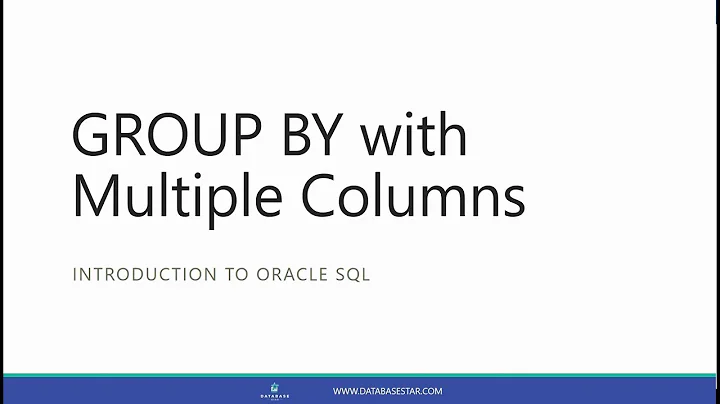group by and union in oracle
Solution 1
The error you've run into
In Oracle, it's best to always name each column in each UNION subquery the same way. In your case, the following should work:
select count(*) as theCount,
COMP_IDENTIFIER
from CORDYS_NCB_LOG
where AUDIT_CONTEXT='FAULT'
group by COMP_IDENTIFIER -- don't forget this
union
select count(*) as theCount,
COMP_IDENTIFIER
from CORDYS_NCB_LOG
where AUDIT_CONTEXT='RESPONSE'
group by COMP_IDENTIFIER
order by theCount;
See also:
Curious issue with Oracle UNION and ORDER BY
A good workaround is, of course, to use indexed column references as suggested by a_horse_with_no_name
The query you really wanted
From your comments, however, I suspect you wanted to write an entirely different query, namely:
select count(case AUDIT_CONTEXT when 'FAULT' then 1 end) as faultCount,
count(case AUDIT_CONTEXT when 'RESPONSE' then 1 end) as responseCount,
COMP_IDENTIFIER
from CORDYS_NCB_LOG
where AUDIT_CONTEXT in ('FAULT', 'RESPONSE')
group by COMP_IDENTIFIER
order by responseCount;
Solution 2
The column names of a union are determined by the first query. So your first column is actually named FAULTCOUNT.
But the easiest way to sort the result of a union is to use the column index:
select ...
union
select ...
order by 1;
You most probably also want to use UNION ALL which avoids removing duplicates between the two queries and is faster than a plain UNION
Related videos on Youtube
eshaa
Updated on June 09, 2020Comments
-
eshaa almost 4 years
I would like to union 2 queries but facing an error in oracle.
select count(*) as faultCount, COMP_IDENTIFIER from CORDYS_NCB_LOG where AUDIT_CONTEXT='FAULT' union select count(*) as responseCount, COMP_IDENTIFIER from CORDYS_NCB_LOG where AUDIT_CONTEXT='RESPONSE' group by COMP_IDENTIFIER order by responseCount;Two queries run perfectly individually.but when using union,it says ORA-00904: "RESPONSECOUNT": invalid identifier
-
user_0 almost 9 yearsYou are creating a resulset with a column with the count. You are defining 2 names for the same column. There is a correct answer, I'm just wondering if you want a single column or 2 columns.
-
eshaa almost 9 yearsi need 2 columns faultCount,responseCount
-
-
Lukas Eder almost 9 years"The column names of a union are determined by the first query" - In fact, that's not entirely correct (for Oracle). It may well be that there is no available column name in
ORDER BY. This might just be a bug, though -
eshaa almost 9 yearsI need the resultset columns to be faultCount,responseCount,COMP_IDENTIFIER
-
eshaa almost 9 yearsIt says ORA-00937: not a single-group group function
-
Bill almost 9 yearsThen you don't want a UNION. UNION says build one data set with the data from the second query tacked onto the end of the data set from the first query - and line up the columns. JOINs are for putting together two queries onto the same row.
-
eshaa almost 9 yearsThank you.It works.But is there a way to enhance it.It takes more than 10 seconds to retrieve which is not acceptable in case.
-
 a_horse_with_no_name almost 9 years@user1650864 The union only has two columns. And one column can only have one name. You can't name the first column
a_horse_with_no_name almost 9 years@user1650864 The union only has two columns. And one column can only have one name. You can't name the first columnFAULTCOUNTandCOMP_IDENTIFIERat the same time. -
Lukas Eder almost 9 years@user1650864: You should probably have an index:
CREATE INDEX my_index ON CORDYS_NCB_LOG(COMP_IDENTIFIER, AUDIT_CONTEXT) -
eshaa almost 9 yearshi,Can you post the query u r trying to explian
-
 a_horse_with_no_name almost 9 years@user1650864: I'm trying to explain your query.
a_horse_with_no_name almost 9 years@user1650864: I'm trying to explain your query. -
eshaa almost 9 yearsStill it takes 16 seconds !
-
Lukas Eder almost 9 yearsOh, perhaps, an additional
AUDIT_CONTEXT in ('FAULT', 'RESPONSE')predicate might do the trick...
![Bài 3: [Học SQL từ đầu] - Sữ dụng Inner Join, Left Join, Right Join, Full Outer Join, Union](https://i.ytimg.com/vi/-db9i6Kv5CM/hqdefault.jpg?sqp=-oaymwEcCOADEI4CSFXyq4qpAw4IARUAAIhCGAFwAcABBg==&rs=AOn4CLB3CT5XCOi8VH5dWwreBaYU0KpCIA)





